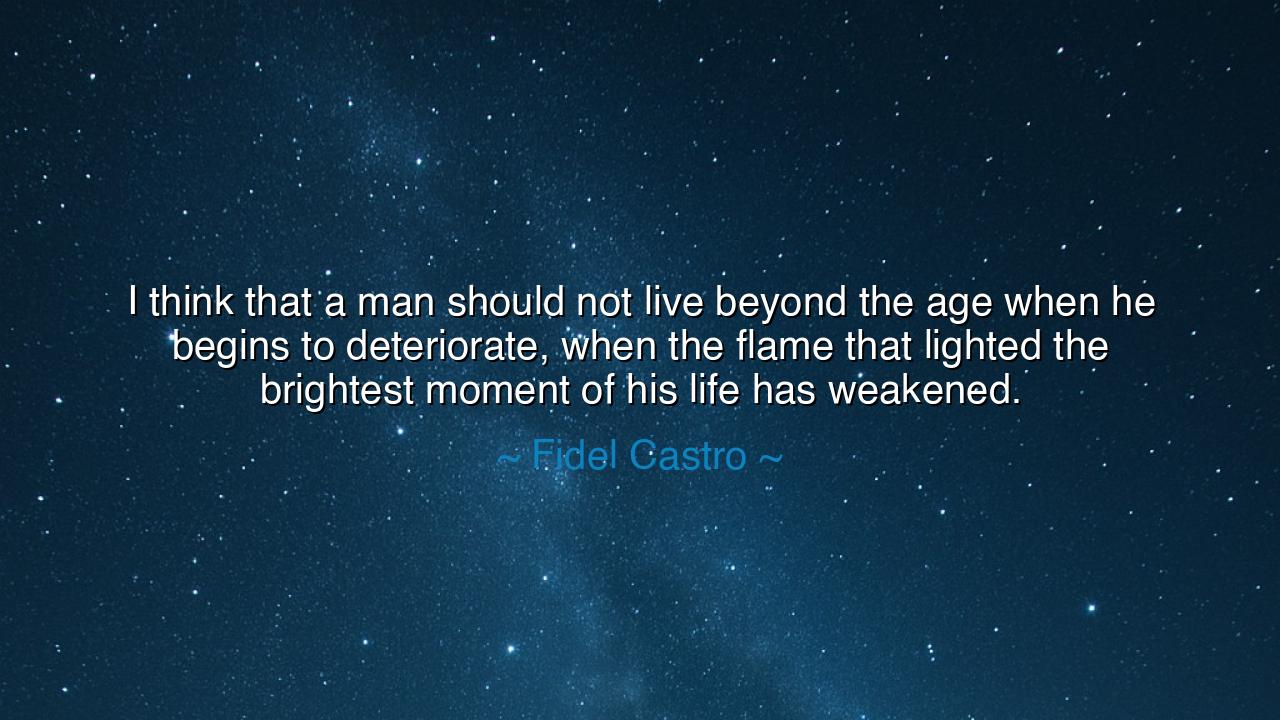
I think that a man should not live beyond the age when he begins
I think that a man should not live beyond the age when he begins to deteriorate, when the flame that lighted the brightest moment of his life has weakened.






In the inevitable march of time, all things are born, rise, and eventually fade, from the greatest empires to the most luminous lives. The words of Fidel Castro, "I think that a man should not live beyond the age when he begins to deteriorate, when the flame that lighted the brightest moment of his life has weakened," offer a profound reflection on the nature of life, purpose, and death. He speaks to the understanding that true vitality and purpose are not infinite, and that there comes a time when the spirit, like a flame, begins to burn low. To live beyond that moment is to risk losing the essence of what makes us alive.
The ancients knew well the relationship between life and death. Socrates, though a man of boundless intellectual energy, understood that death, like life, was an essential part of the human experience. He chose to face death with dignity rather than resist it, believing that his time had come and that he had lived a life full of meaning and purpose. The ancient Greek philosophers taught that wisdom did not come merely from knowledge, but from understanding the natural course of existence, including our own mortality. Castro's words reflect a similar philosophy—one that values purpose over mere existence, and quality over quantity in life.
Consider, for example, the life of Alexander the Great, whose conquests stretched far beyond the known world. Though young in years, Alexander’s flame burned brightly, achieving extraordinary feats in a short time. But with his untimely death at 32, many wondered what more he might have accomplished had he lived longer. His glory, though immense, was fleeting, and in the eyes of the ancients, his brief life was marked by the brilliance of his action and the purpose he embodied. Like Castro's notion of deterioration, Alexander's story reminds us that greatness lies not in living forever, but in living a life so full of purpose that its light burns brightly, even if only for a time.
Similarly, Nelson Mandela lived a life that reflected Castro's understanding of the flame that burns in us all. After spending 27 years in prison, Mandela emerged not as a bitter, weary man, but as a figure of wisdom, peace, and strength. His final years, though not physically as strong, were marked by a serene wisdom. Mandela had faced the physical deterioration of age, but his inner flame never dimmed—his resolve remained firm, his purpose clear. He chose to live his later years in service, leading by example, reminding us that meaningful life transcends the limitations of the body.
However, the lesson that Castro imparts is not one of resignation to death, but a call to live meaningfully while we can. To be aware of our mortality is to understand the fleeting nature of time and the urgency with which we must live our lives. The flame that Castro speaks of is not just a reference to physical vitality, but to the passion, the vigor, and the purpose that defines us. We are all called to live our lives with intensity, to seek out the moments that ignite our souls, and to carry that flame with us through the years, knowing that when it dims, it is time to step aside and allow the next generation to carry it forward.
In our own lives, we must strive to recognize the moments of brilliance that define us, and to live with purpose in those moments. To live meaningfully is not to defy the passage of time, but to embrace it, to live with awareness that the flame will not always burn as brightly, and to treasure the time when it does. It is not about fighting against age, but about recognizing the power of quality over quantity. Like Socrates, like Mandela, and like Alexander, we are called to live fully, to pursue our purpose, and to make our lives count, not in years, but in the depth of meaning we create.
The final lesson, then, is one of acceptance—accepting that our time is limited and precious, and that the beauty of life lies not in its length, but in the legacy we leave behind. As Fidel Castro suggests, we must live in such a way that the flame of our purpose burns brightly, lighting the way for others, even when our own light begins to dim. In the end, it is the depth of our actions and the integrity of our choices that matter most, and it is through these that we find our true immortality.






AAdministratorAdministrator
Welcome, honored guests. Please leave a comment, we will respond soon